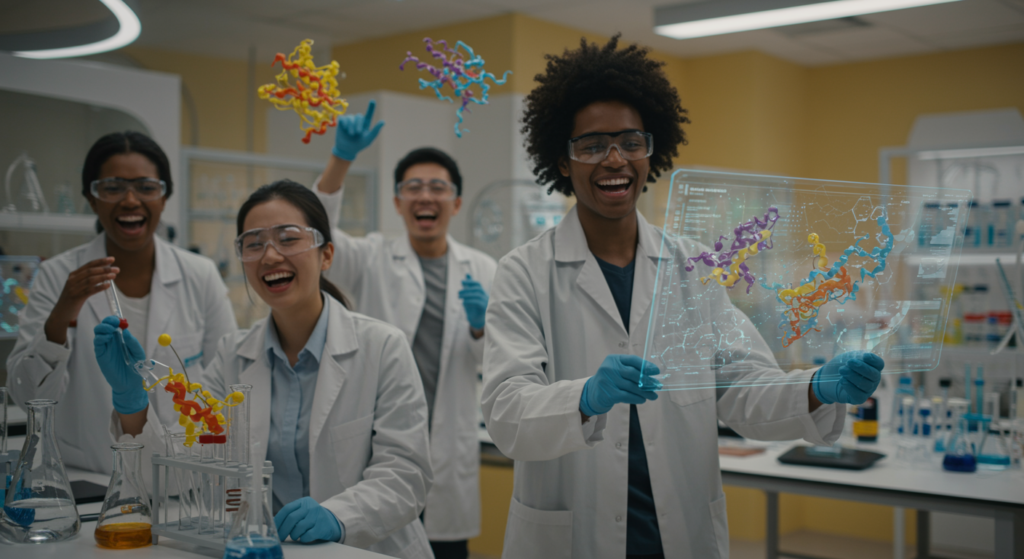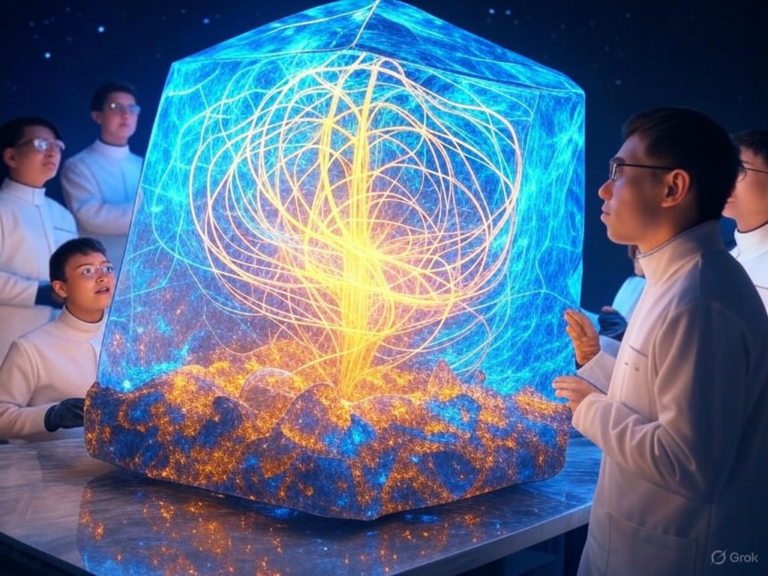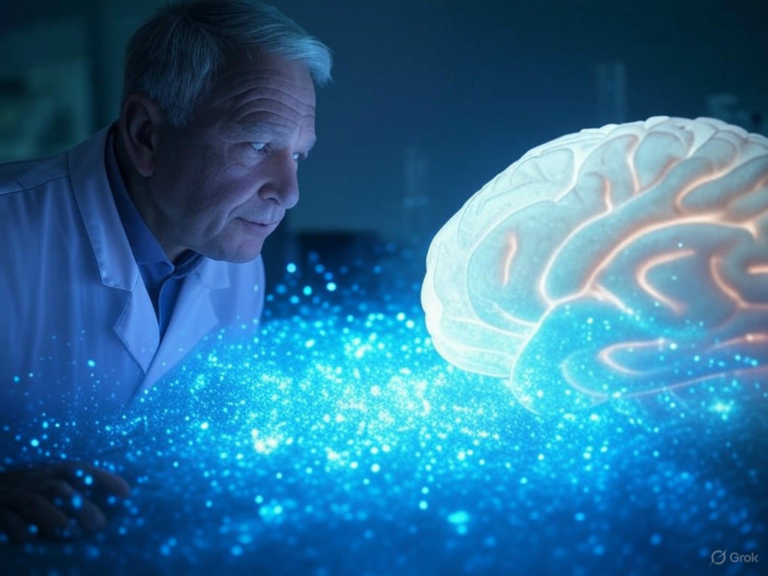
AI in Healthcare: Nobel Laureate’s Bold Vision to Cure Diseases
The Revolution of AI in Healthcare: A New Era of Medicine
AI in healthcare is emerging as a game-changer, with Nobel laureate Sir Demis Hassabis predicting that artificial intelligence could cure all diseases within the next decade. As CEO of Google DeepMind and a 2024 Nobel Prize winner in Chemistry, Hassabis envisions a future where AI accelerates drug development and innovation as reported by The Economic Times. Imagine cutting the time and cost of creating a new drug from years and billions of dollars down to weeks—what could that mean for global health?
In a recent CBS News interview, Hassabis shared his excitement: “It takes ten years and billions of dollars to design just one drug. We can maybe reduce that down from years to maybe months or maybe even weeks.” This bold statement isn’t just hype; it’s rooted in real progress that’s already reshaping medical research. Have you ever wondered how AI might make diseases like cancer or Alzheimer’s a thing of the past?
While this timeline sounds ambitious, Hassabis’s insights draw from tangible advancements, proving that AI in healthcare isn’t science fiction anymore. Experts agree that this shift could revolutionize how we tackle illnesses, offering hope where traditional methods fall short.
The Foundation of AI in Healthcare: AlphaFold’s Breakthrough
Central to Hassabis’s vision is AlphaFold, DeepMind’s AI system that’s already predicting protein structures with stunning accuracy. This innovation earned Hassabis and John Jumper the 2024 Nobel Prize in Chemistry for solving a 50-year-old puzzle in biology. By decoding 200 million protein structures in just one year, AlphaFold highlights the power of AI in healthcare to speed up discoveries that once took decades.
Think about it: Proteins are the building blocks of life, influencing everything from immune responses to disease progression. With AI in healthcare tools like AlphaFold, researchers can now explore these complexities faster than ever, paving the way for new treatments.
Beyond Protein Structures: Advancing Drug Development with AI
Building on this success, Hassabis launched Isomorphic Labs in 2021 to focus on AI-driven drug discovery. Instead of traditional labs, they’re leveraging algorithms and synthetic data to innovate, potentially slashing development timelines. This approach could transform the pharmaceutical industry by making AI in healthcare a cornerstone of efficient, precise molecular design.
Traditional methods often involve lengthy trial-and-error, but AI changes that by predicting interactions and optimizing structures early on. If you’re curious, consider how this might lead to personalized medicines tailored to your unique biology—could it be the key to preventing diseases before they start?
With AI in healthcare, the potential for higher success rates in drug trials is real, offering a glimpse into a more efficient future for medicine.
Broader Impacts of AI in Healthcare Systems
AI in healthcare isn’t limited to drug discovery; it’s already enhancing diagnostics, patient care, and treatment across the board. IBM’s research shows how artificial intelligence is improving accuracy in medical imaging and early disease detection, making it an essential tool for modern medicine. From spotting cancer earlier to streamlining operations, these applications are proving their worth every day.
Current Uses of AI in Healthcare Today
Let’s break it down: AI assists doctors by analyzing images faster and more accurately, helping detect conditions like sepsis before they worsen.
- Speeding up medical image analysis for quicker diagnoses
- Flagging early signs of diseases such as cancer or heart issues
- Guiding real-time decisions with data-driven insights
- Monitoring patients remotely for better ongoing care
- Optimizing clinical trials to bring new treatments to market sooner
- Offering virtual support through AI assistants
These tools don’t replace doctors; they enhance their expertise, potentially saving lives through timely interventions. As AI in healthcare evolves, it’s easy to see how it could make healthcare more accessible and effective for everyone.
The Vision of Digital Doctors in AI in Healthcare
Geoffrey Hinton, known as the godfather of AI, echoes Hassabis’s optimism, suggesting AI systems could outperform doctors in certain areas within 10-15 years. As a 2024 Nobel Prize winner in Physics, Hinton believes AI in healthcare will deliver second opinions and personalized advice, transforming patient interactions. His work on neural networks is already influencing large language models that “understand” complex medical data.
“I’m hoping AI will lead to tremendous benefits in healthcare,” Hinton said, emphasizing its potential to boost productivity and improve lives. Picture a world where an AI-powered app gives you tailored health advice based on your daily habits—sounds empowering, right?
Personalized Medicine via AI in Healthcare
One exciting aspect is how AI enables treatments customized to individual needs, using vast data sets for precise diagnoses. For instance, if you’re dealing with a chronic condition, AI could analyze your history and suggest the best options, making healthcare feel more human-centered.
This shift could empower patients with better insights, from understanding their risks to choosing proactive steps. In the future, AI in healthcare might even predict and prevent issues, turning wellness into a daily reality.
The Massive Potential Impact of AI in Healthcare
Hassabis compares AI’s influence to that of electricity, predicting it could outstrip the internet’s reach, especially in healthcare. GlobalData surveys back this up, labeling AI as the most disruptive technology for businesses today. It’s not hard to see why: AI in healthcare could address major challenges like rising costs and provider shortages.
For example, Perplexity AI’s CEO called Hassabis a genius for this vision, urging full support to make it happen. What if AI not only cures diseases but also makes healthcare equitable worldwide?
This enthusiasm stems from AI’s ability to tackle issues like drug repurposing and side effect prediction, fundamentally changing the game.
Evolution of Drug Discovery Through AI in Healthcare
Traditional drug development relies on complex processes like transition metal catalysis, which are slow and prone to failure. AI in healthcare is flipping this script by predicting interactions, generating new molecules, and simulating effects across populations. According to a study from an industrial perspective on catalysis, these AI advancements could reduce risks and accelerate progress.
Imagine AI quickly identifying a drug for a rare disease—that’s the kind of efficiency we’re talking about. Tips for staying informed: Follow updates from leaders like DeepMind to see how AI in healthcare is evolving.
By addressing long-standing challenges, AI is making drug discovery more innovative and reliable.
Balancing Optimism with Realism in AI in Healthcare
While the excitement around AI in healthcare is contagious, we must temper it with reality. Diseases are incredibly complex, and regulatory hurdles could slow adoption. Even Hassabis admits that curing all diseases in a decade might be optimistic, but the progress is undeniable.
Ethical issues, like data privacy, need careful handling to ensure AI benefits everyone fairly. Still, the trajectory suggests AI will reshape healthcare in profound ways—perhaps not overnight, but steadily.
A practical step? Stay educated on AI developments and advocate for responsible use in your community.
The Future of AI in Healthcare
If Hassabis’s vision unfolds, the next decade could usher in an era where AI not only supports healing but designs it from the ground up. From protein prediction to targeted therapies, AI in healthcare is poised to make diseases manageable or even preventable. As systems worldwide face pressures, this technology offers a beacon of hope.
Here’s a quick tip: Explore AI apps for health tracking to see the benefits in action today. What are your thoughts on this transformative potential—could it change how you approach your own health?
In wrapping up, AI in healthcare stands as a promising force for good. We invite you to share your insights in the comments, explore more on our site, or spread the word about this exciting frontier. Together, let’s discuss how AI might shape a healthier tomorrow.
References
1. The Economic Times. “Can AI Cure All Diseases Within a Decade? Nobel Laureate and DeepMind CEO Demis Hassabis Shares Bold Vision for the Future of Medicine.” Link
2. ICT&health. “Nobel Prize for AI: Digital Doctors to Be Expected in 10-15 Years.” Link
3. Pharmaceutical Technology. “DeepMind Nobel Prize Winner Says AI Will Have Electricity-Type of Impact.” Link
4. The Economic Times. “AI Can Be End of Disease: Google DeepMind CEO Demis Hassabis Says.” Link
5. CoMotion. “Start Something: Nobel Prize Laureate David Baker on AI’s Impact on Life Science & Healthcare Startups.” Link
6. Piersanti, Giovanni. “Applications of Transition Metal Catalysis in Drug Discovery and Development – An Industrial Perspective.” Link
7. YouTube. [Video related to AI in healthcare]. Link
8. Oliver Pickup. “Artificial Intelligence Category.” Link
AI in Healthcare, Demis Hassabis, disease cures, AlphaFold, Nobel Prize, drug development, artificial intelligence, future of medicine, personalized treatment, AI innovations







